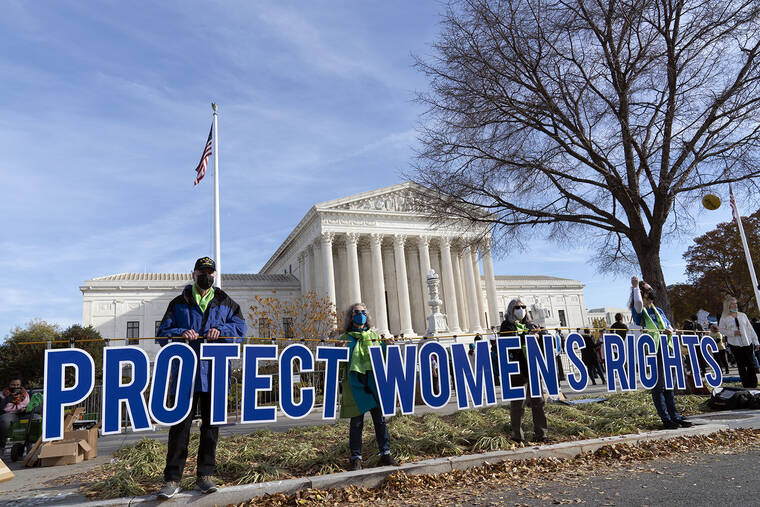Few want Roe overturned, but abortion opinions vary widely

Abortion rights advocates demonstrate Wednesday in front of the U.S. Supreme Court in Washington. (AP Photo/Jose Luis Magana)
WASHINGTON — Arguments before the Supreme Court this week signaled that the conservative-leaning bench may dramatically limit abortion rights in the United States.
WASHINGTON — Arguments before the Supreme Court this week signaled that the conservative-leaning bench may dramatically limit abortion rights in the United States.
The decision whether to uphold Mississippi’s 15-week abortion ban will determine the fate of the court’s 1973 Roe v. Wade decision legalizing abortion and its 1992 ruling in Planned Parenthood v. Casey, which reaffirmed Roe.
ADVERTISING
In 2020, AP VoteCast showed 69% of voters in the presidential election said the Supreme Court should leave the Roe v. Wade decision as is; just 29% said the court should overturn the decision.
Even so, polling suggests Americans have nuanced attitudes on the circumstances under which abortion should be allowed.
While Americans likely won’t know the high court’s ruling until June, here’s where public opinion stands on abortion before the pivotal decision.
BIG PICTURE: Overall, when asking Americans whether abortion should be legal or illegal, a majority of Americans side with abortion rights. In June, a poll from The Associated Press-NORC Center for Public Affairs Research showed 57% of Americans saying abortion should be legal in all cases or in most cases, while 43% said it should be illegal in all cases or most cases. Relatively few Americans think abortion should be either legal in all cases or illegal in all cases.
Most Americans have said for decades that abortion should be legal in at least some circumstances. A question asked by Gallup since the 1970s about when abortion should be legal consistently shows only about 2 in 10 Americans say abortion should be illegal in all cases.
IN WHAT CASES: The June AP-NORC poll asked Americans whether abortion should be allowable if the woman’s health or the child’s health is seriously endangered, or if the pregnancy is a result of rape or incest. Most Americans say abortions should be allowed in all of those circumstances, including majorities of conservatives. The Mississippi law makes few allowances in the case of medical emergencies or “a severe fetal abnormality.”
But support for abortion rights declines significantly for a woman who does not want to be pregnant “for any reason.” About half of Americans think abortion should be possible in that case.
A MATTER OF TIME: Precedent established by the court has given states the ability to restrict abortion rights after the point where a fetus may be viable outside of the womb, or about 23 weeks. But in Wednesday’s arguments, Chief Justice John Roberts called a 15-week ban “not a dramatic departure from viability,” saying “if it really is an issue about choice, why is 15 weeks not enough time?”
Similar to support for abortion rights in general, the June AP-NORC poll showed a clear majority — 61% — saying abortion in the first trimester should be legal in all or most cases; only 16% said abortion should always be illegal.
After the first trimester, though, most Americans say there should be restrictions on abortion rights. While many still leave room for abortion in some cases, especially in the second trimester, majorities say abortion in the second or third trimester should usually or always be illegal.
In the second trimester, about a third say abortion should usually — but not always — be illegal, and roughly as many say it should always be illegal. About a third say abortion should always or usually be legal.
A majority — 54% — said abortion in the third trimester should always be illegal, and another 26% said it should usually be illegal. Just 19% said abortion in the third trimester should be legal in all or most cases.
LEAVE IT TO THE STATES?: While the high court’s precedent established abortion rights throughout the United States, upholding Mississippi’s law would give states the power to chip away at those rights.
In arguments on Wednesday, Justice Brett Kavanaugh, who was appointed to the bench by former President Donald Trump, questioned whether the court should be involved in the abortion issue.
“Why should this court be the arbiter rather than Congress, the state legislatures, state supreme courts, the people being able to resolve this?” Kavanaugh asked. “And there will be different answers in Mississippi and New York, different answers in Alabama than California.”
Abortion would soon become illegal or severely restricted in roughly half the states if Roe and Casey are overturned, according to the Guttmacher Institute, a research organization that supports abortion rights. Legislatures in many Republican-led states are poised for action depending on the Supreme Court’s ruling.
The June AP-NORC poll showed Americans were closely divided over whether the federal government or state governments should have the larger role in making laws related to abortion, but leaned slightly toward national governance, 52% to 45%.


